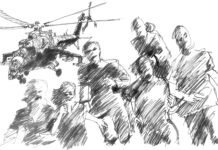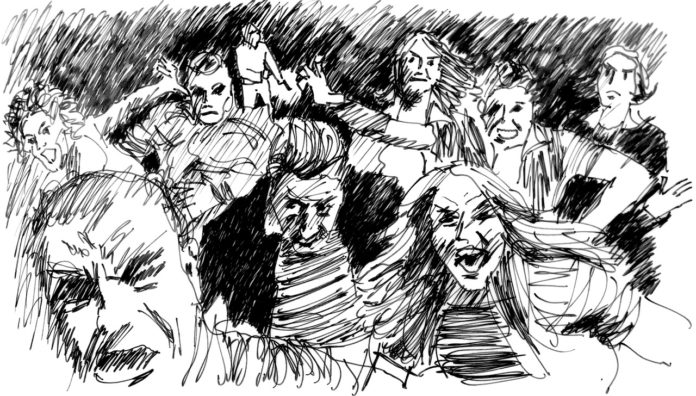By Ted Leonhardt
Three shots. I think it was three. Then the man with the gun ran. The crowd panicked. Some hit the deck. The rest of us ran for it. It was supposed to be a peaceful rally. I wouldn’t have come if I’d thought otherwise.
There had been CEO shootings elsewhere—but Seattle? I thought it could never happen here. And he was supposed to be one of the good guys, although his income was reported at more than $50 million last year.
I dare to have this fantasy because we’re on the brink.
Brink of anarchy
We’re on the brink—the brink of a dystopian world. The effects of global warming are far more apparent now. Radical white supremacists attacking people of color, fearing loss of historical advantage. Ideologies fighting, not conversing. Mass migrations as farms dry up. The middle class shrinking, as capital becomes increasingly valuable and the work that creates capital loses value. Capitalism’s promise of a “shining city upon a hill” and plenty for all proving to be a lie.
We’ve had 200 years of using the land, the water and the air as a dumping ground in the quest for corporate profits. And the result is global warming and civil unrest.
Climate advocates join animal-rights proponents in attacks on butchers, markets and slaughterhouses. Animal agriculture is not only mass-animal genocide—it’s a huge contributor to global warming.
Coal and oil produce much of our electricity—and more than a quarter of our greenhouse gas emissions. Stylish electric cars won’t save us.
Forests and the animals that inhabit them are decimated for lumber and corporate farms, reducing their natural ability to absorb carbon emissions.
The oceans fill with plastic, and microplastics show up in human poop.
Right-wing leaders use race to rise in power and stay on top.
Hope
At the same time, good things are happening, too. Following the lead of France and Japan, many countries are setting limits on CEO pay, at least on companies that have governments as investors. The yellow-vest movement for fair treatment and pay grows in spite of heavy-handed attempts by governments to shut them down. Beef consumption shrinks. Clean energy grows.
Worker co-ops like ours are growing dramatically. And more new worker co-ops are starting than any time in history. B-corps—for-profit companies dedicated to achieving positive social and environmental impact—grow.
Good signs all. But not enough to stem the world’s warming and the rising waters of social unrest.
Contact
My fantasy continues.
Safe, but still shaking from the shooting, I got the email on the way home. I opened it and read that the chairman of General Motors wanted to set up a call with me the following week. Yikes. The chairman of GM—Bill Jones! He suggested a couple times. I replied yes and began Googling GM and the chairman.
Yes, diesel pickup sales were dwindling. Lots of coverage of their newly fortified corporate headquarters. Profits were down dramatically. Yes, GM had a new board and chief executive. Yes, they were building self-driving cars under Apple’s license. So change was clearly afoot.
On the day of the Skype conversation, I suspected he wanted to tap into the success of our creative co-op, somehow. We’d gotten a lot of good coverage of our work for some pretty big clients; nothing like GM, though. I also suspected the rash of CEO shootings and civil unrest were starting to have an impact on a lot of C-suites. But I was only guessing.
At our creative co-op, we’d been putting on our “Group Visioning” theater-in-the-round shows at major industrial trade shows for several years now. Our most popular show, “Creativity Challenges Dystopia,” had sold out at the recent Detroit Auto Show. Maybe he’d attended?
Cry for help
He came up on my screen and opened with, “Brie? Is it okay if I call you Brie?”
“Yes, yes of course. I’ve been trying to guess the reason for your call all week. What’s on your mind?”
“Brie, we want to work with you. And before you say no, I want you to know that my board and I have made some major changes. Changes we believe will make us the kind of client you’ve pledged to support.”
Group Visioning
“Brie, I was captivated by the ‘Group Visioning’ performance your co-op presented in that theater-in-the-round setting at the show this year.”
He went on to say that he was inspired by our use of dystopian literature in our performance at the Detroit show. We used Orwell, Huxley, Vonnegut,
Gibson and others as sources of inspiration, to avoid the perils envisioned by the darkest of our sci-fi writers.
I was thrilled. This was General Motors. I’d read the news. But it hadn’t occurred to me that they’d actually be influenced by us.
The chairman went on: “We’re about to announce an increase in wages for all employees. And no one will be paid more than six and a half times that of our lowest employee, including our CEO.”
“That’s huge, Bill…”
“There’s much more change coming, Brie. We’ve just opened negotiations with our unions by informing them that we’re introducing an employee retirement program that’s funded, in part, by profits freed up by reductions in management compensation.”
“What’s driving these changes?”
“Well, you read the news, Brie. Consumer boycotts against executive pay, excessive energy consumption, environmentally damaging corporate practices: we see people—rightfully, I must say—rebelling against damaging corporate practices.
“Brie, we must change our focus from pleasing Wall Street to meeting the needs of the world’s home street. Hence this call.”
Envision the best we can be
He went on to tell me they wanted our creative co-op to help GM envision what they could do to create a better everyday life for people and the planet, by tackling major issues such as climate change, civil unrest, sprawling urban growth, fair and equable employment, sustainable transportation and lack of food security.
They wanted the creative co-op to use our Group Visioning methods, which are based in literature and creative thought, to help GM create the best possible future for its people, people everywhere, and the world as a whole.
“Brie, the board and I want GM to become the first of the world’s industrial giants to align with the real needs of people and the planet.” We made a verbal-handshake deal and ended the call.
This is exactly what we’d dreamed of. Hoped for. And worked to make happen. Still, it was a shock. We’d hoped our efforts would reach the center of America’s industrial heartland and change the game. It was a worthy goal, but I guess I’d never imagined it would really happen. Not in my lifetime, anyway.
But here we were—in my dreams at least.






